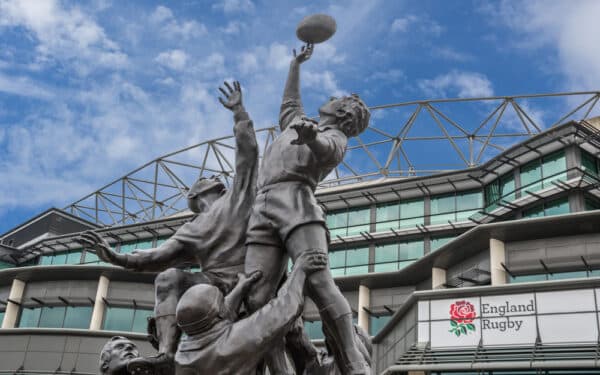The collapse into administration of top flight rugby clubs Worcester and Wasps has brought to the fore a seemingly unresolvable tension in the way we see our sport. A tension between the business environment in which professional athletic endeavour must live and our emotional view of our team as a field of dreams, local champions and a break from that part of our own lives which is itself business, whatever our business may be.
Football fans have long suffered from this residual notion that clubs packed full of international sporting mercenaries are still, somehow, community projections, communal property and constructs of the fans, no matter where those fans may be watching, nor from where their chief investor hails.
But for all the sentimentality, football has been ruthless. It demotes, no matter how the stripped-to-the-adipose man babies of the terraces grizzle every May when Fulchester United get sent down “in last-minute heartbreak”.
To fail financially is to be sent, without a backward glance, into oblivion, no matter how aged the name nor recent its triumphs. Sporadic outbreaks of “board out” demonstration which simultaneously demand investment but no risk are largely flashes in the pan.
Only in the ill-advised Super League proposal did the massed outrage of the supporter play a part in halting the commercial juggernaut.
Football, though, is different. It is genuinely global, attracting huge commercial interest and vast financial backing. Its TV and stadium audiences, its salaries and sponsorships dwarf those of rugby which is the primary sport in very few parts of the world.
Take London as a microcosm. It houses Harlequins at Twickenham and London Irish at Brentford. The former is a regular 14,000 sell-out. The latter isn’t. Spurs accommodates a full-house 62,000 and is one of seven Premier League football clubs dotting the capital.
Rugby has for too long “reckoned itself”. It is a distant moon to a vast planet. Its hubris, some sort of hangover from its rather inflated sense of virtue, has deluded it. Cricket similarly. Its county grounds are empty and the international game reliant on the gravity pull of the big three; England, Australia and India of which the latter is the dominant financial player. Its Long Room sensibilities remain undiminished, however, and its sense of complacent crisis permanent. A shame because hard money and professional infrastructure have improved both sports vastly from the field to the facilities.
Meanwhile Wasps and Worcester are, wrongly and rightly, being held up as symptomatic. Wrongly because the problems of both are particular. Worcester’s in poor management and overreach and Wasps’ in its hermit crab existence. Its attempt finally to find a permanent home, way outside its London and suburbs stomping ground, inexplicably seeing it fetch up in Coventry and a stadium its accounts and crowd couldn’t sustain. “Once a Wasp, always a Wasp” went the slogan. Well, up to a point.
Rightly, because they are examples both of a sport whose self-regard doesn’t allow it to see the true breadth of its appeal which is as a minority pursuit. Though it should be said that there is no sport which has not attracted the business ego with commensurate periodic catastrophe following shortly afterwards. We are not alone.
Where that leaves the on-looker is intriguing. Rugby, as its wont, is attempting a sort of spiritual rallying round as though somehow collective fellow feeling will solve its problems. Football would have thought up a cruelly amusing chant. Neither really helps.
The extent of people’s love – and that is the word – for their clubs is often moving. David James, the England goalkeeper, tried to pay the wages of support staff when Portsmouth hit the skids. At Wasps, the ever-amusingly named Dai Young was buying the medical equipment out of his own pocket and similar selflessness marked the dying days of Worcester.
Anyone who has ever entered the dressing room, pulled on the shirt and walked out will know the heft of history, the breast-filling pride and almost the disbelief it invokes. It can cloud judgement. Former Wasp and pundit, Lawrence Dallaglio, suggesting on BT Sport that his former club were, in effect, too special to be dropped. A sentiment he withdrew soon afterwards.
Meanwhile, fans invest so much of themselves in what are, at the end of it all, collections of people in common cause and a shared passion. On any given Saturday, they climb aboard the rollercoaster willingly, roar and lament, share a pint and a tale, pay their money and make their choice.
Their woe when their beloved is taken from them is ever more understandable. But the unfortunate fact is that they sold her long ago as the only way to keep the dream – and the delusion – going.
It is a sign of our times that they call for bail-outs and regulatory intervention in a desperate “something must be done” plea for what is, ultimately, a business failure. And one with consequences for other clubs who are deprived of fixture revenue and must operate in a de-valued league, two clubs short and half the season not yet done. Someone else must pay for bad management and all the while under the illusion that somehow this was “done to them” by mysterious and malign forces rather than poor decisions, ego and the good intentions that pave the road to hell.
Sport – like buying cars and having children – is often the worst mix of emotion, instinct and economic judgement and sometimes love doesn’t conquer all. The sooner we get used to it, the better.




